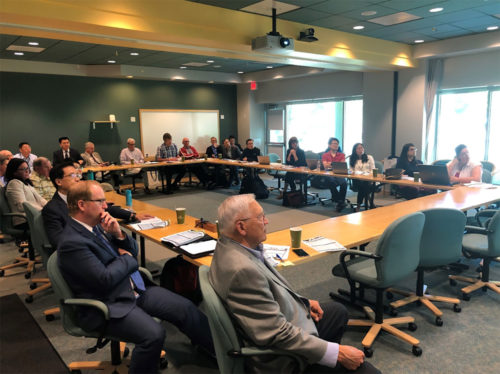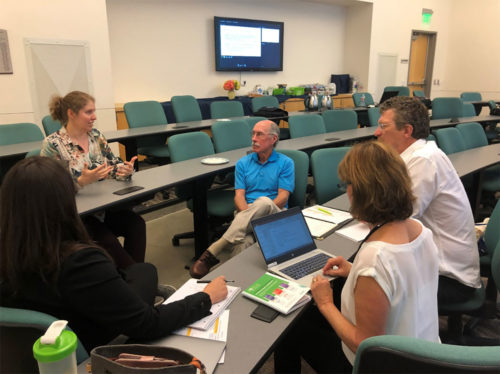Global One Health Symposium Looks at Approaches to Solving the Problem of Transboundary Diseases
Chris Brunner – November 7, 2019

Dean Lairmore and Bennie Osburn along with participants attending the NAU – UC Davis Global One Health Symposium
The explosive spread of African Swine Fever (ASF) across China and Southeast Asia as well as Eastern Europe demonstrates the devastation that a transboundary disease can have on the global economy and food security. New Scientist reports that half the pigs in China – which last year numbered 440 million, some 50 per cent of the world’s pigs – have either died of African swine fever (ASF) or been killed to stamp out the virus. ASF is now in every province in China. The virus may have spread there from North Korea. A quarter of the world’s domestic pigs have died this year. African swine fever is throughout Russia and eastern Europe. As far west as Belgium wild boar have turned up with ASFV.
The critical problem is compounded by the fact that there is no vaccine available to help curb the problem, nor adequate training for biosecurity whereby management practices can be put in place to stop the spread of the virus. Government agencies around the world led by the World Animal Health Organization (Office of International Epizooties (OIE)) are rushing to implement programs that will help keep the virus out of their respective countries.
The Global One Health for Agriculture and Food Systems Consortium convened for a symposium on transboundary animal diseases with a focus on African Swine Fever (ASF) and ASF virus (ASFV). The symposium held at UC Davis School of Veterinary Medicine included the four-member consortium composed of UC Davis, Nanjing Agricultural University, Wageningen University Research, the Netherlands, and Massey University, New Zealand. The participants focused their discussions on the pathogenesis, control and prevention of important transboundary diseases.
The symposium, “NAU-UC Davis One Health for Food Safety and Animal Health Symposium,” sponsored by NAU and hosted by UC-Davis WIFFS, May 28-30, 2019, brought administrators and faculty from the four institutions, and a representative from the USDA/APHIS Foreign Animal Disease Laboratory, Plum Island, NY together to address emerging diseases such as African swine fever. The emphasis of discussions focused on using a One Health approach for diagnosing the disease through collaborative efforts involving scientists such as pathologists, epidemiologists, virologists, clinical professionals, and immunologists. Such a One Health team has the capability to track where sick and dying animals are located; determine how best to prevent the spread of the virus; produce vaccines; determine how the virus causes the types of lesions and the pattern of lesions for diagnostic purposes; and evaluate the spread of the virus in the environment. These exercises are key approaches for diagnostic laboratories addressing animal health, public health and food safety and security. NAU is in the process of establishing a joint international diagnostic laboratory and this symposium provided the opportunity for the consortium to recommend the core disciplines that would be included in the laboratory.
Dr. Bennie Osburn, Dean Emeritus and Director of Outreach and Training at the Western Institute for Food Safety and Security, (WIFSS), and a member of the consortium, recommends that in addition to the multiple disciplines associated with the laboratory it will be important to utilize a vocational workforce of boots-on-the-ground-technicians and veterinary practitioners to characterize the clinical description of animal diseases and to collect samples for submission to the laboratory.
Osburn says, “Outreach and education are key to establishing a robust extension program as a pipeline for getting critical information to the stakeholders.” He further emphasizes, “The key to the success of the laboratory is to train undergraduates, graduate, and post-doctoral students the concept of One Health. Understanding that a One Health approach is essential to addressing complex issues surrounding food safety and security, animal health, and transboundary diseases.”

Beatriz Martinez Lopez, Tim Carpenter, Ed van Klink (Wageningen University), JoAnne McKenzie (Massey University), Sara Garcia summarizing subcommittee deliberations on Epidemiology and Biodiversity
The goal of this symposium was to identify gaps in research, education, and resources to diagnose, respond to and recover and prevent outbreaks such as that of African swine fever. To that end, several working groups were asked to identify relevant training needs and potential control strategies by undertaking gap analyses, with a specific charge to develop recommendations relevant to their subject and the opportunities for producer level biosecurity and for post-graduate/post-doctoral training. The focus of the individual working groups was: Epidemiology & Biosecurity, Surveillance & Diagnostics, Prevention & Control, Pathogenesis & Disease Resistance, Environmental Impact and Human Resources.
It was apparent during the deliberations that in addition to research needs, the efforts for addressing transboundary diseases requires trained personnel to adequately mitigate the spread of a transboundary disease. The available personnel to address rapidly spreading diseases such as ASF, particularly in developing countries, needs technically trained professionals in multiple disciplines and clinical veterinarians for effective disease control. Veterinary colleges can be the leaders in training a professionally diverse workforce who are effective in controlling transboundary diseases.
A summary report of the symposium is being prepared for submission to a journal.
Participants
Beatriz Martinez Lopez, UC Davis
Bennie Osburn, UC Davis
Chris Barker, UC Davis
Chris Brunner, UC Davis
Ed van Klink, Wageningen University
Feng Hu, NAU
Heather Johnson , UC Davis
Hongsheng Zhang, NAU
Jie Chen, NAU
Jihui Ping, NAU
Jim MacLachlan , UC Davis
Jiqin Han, NAU
Joanna McKenzie, Massey University
Karen McDonald, UC Davis
Kimberly Dodd, USDA
Lifan Zhang, NAU
Michael Lairmore, UC Davis
Richard Pereira, UC Davis
Rob Atwill, UC Davis
Ruibing Cao, NAU
Sara Garcia, UC Davis
Wei Wei , NAU
Wim van der Poel, Wageningen University
Xinbin Chen, UC Davis
Xunde Li, UC Davis
Yingjuan Qian, NAU
Yong Sam Jung, NAU
Tracy Goldstein, UC Davis
Robert Poppenga, UC Davis
Tim Carpenter, UC Davis
Jim Cullor, UC Davis
Joanne Emerson, UC Davis
Mike Payne, UC Davis
Jorge Rodriguez, UC Davis
Huaijun Zhou, UC Davis
